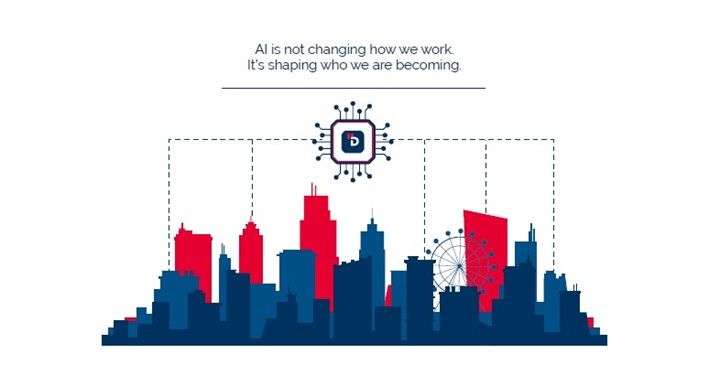Artificial intelligence: a catalyst for global and responsible transformation at Daher

06/25/2025
At Daher, artificial intelligence (AI) is more than just a technological advancement – it marks a strategic, cultural, and operational turning point that is transforming how the company designs its products, manages its industrial operations and develops new services. Backed by a clear strategy, along with technologies tailored to its businesses and strengthened human support, Daher is placing AI at the core of its industrial and technological future.
Daher’s AI strategy is built on a clear, coherent trajectory that is aligned with its industrial priorities. The goal is to enhance product performance, optimize internal processes by automating low-value-added tasks, and enable innovative services and use cases that only AI can unlock.
This is carried out in a responsible approach, involving solutions that are secure, along with the development of an AI charter focused on transparency, confidentiality, accountability, and environmental impact.
A step-by-step approach built around three core AI families
Daher structures its AI roadmap around three complementary functional categories:
AI Assistants,such as Microsoft Copilot, support employees with their day-to-day tasks, including drafting of documents, information searches, and the automation of repetitive work. While AI Assistants do not make complex decisions, they free up valuable time so teams can focus on what truly matters.
AI Agents are more deeply integrated and capable of interacting with Daher’s information systems (ERP/enterprise resource planning, finance, human resources, etc.). These agents automate process chains, simulate scenarios, and cross-analyze internal data sources. Several pilot programs are underway to assess their operational impact.
Expert AIs are trained on Daher’s proprietary data sets and serve as high-value business tools. Their ability to automate, predict, and analyze is deeply transforming industrial, logistics, and aerospace processes. Real-world use cases clearly illustrate this technological shift.
Actual use cases that are reshaping Daher’s business
Aircraft: from data to diagnosis in 24 hours
Technical alerts on aircraft used to take weeks to diagnose, involving international teams and time-consuming data collection. With connectivity in the Daher-built TBM and Kodiak general aviation/business aircraft, flight data can be automatically uploaded after each trip. Some 400 TBM aircraft today – to be joined soon by the Kodiak fleet – send daily data feeds that power in-house machine learning models. These models detect anomalies, analyze root causes, and generate reliable diagnostics in less than 24 hours. The results: faster repairs, less downtime, and safer flights. Pilots receive technical reports upon landing, and maintenance teams can act with precision.
Logistics: optimized warehouse design
Daher has developed an intelligent assistant – a logistics co-pilot – capable of transforming briefs, blueprints, Excel files, or even photos into actual proposals for flow architecture, automation levels, and workforce planning. With models trained on Daher’s own data and business rules, AI can propose, simulate, refine, and validate in minutes what used to take weeks. Logistics experts remain involved to validate technical decisions and ensure successful implementation. This approach is revolutionizing the way Daher designs and deploys logistics platforms – from concept to execution. The JUMEL digital twin project is a flagship example.
Manufacturing: welding faster – and smarter
In Daher’s factories, AI also is transforming how the company performs its manufacturing. One standout example is the welding of thermoplastic composites – a key technology for producing lighter, more efficient aircraft components. Drawing on a database of over 160 documented welds – each with 30 parameters – Daher teams have trained a predictive model to estimate mechanical strength even before a part is produced. This significantly reduces destructive testing, improves understanding of performance variations, and allows for justified non-conformities without compromising safety. The model enhances design, accelerates qualification, and strengthens production reliability. And it’s just the beginning: Daher is now applying this approach to such processes as machining, forming, and fiber placement – while also using AI to optimize energy consumption across its sites and production resources.
Empowering employees through the AI transition
In 2024, a pilot deployment of Microsoft Copilot within a small group of Daher users led to productivity gains of up to 15 percent for certain administrative tasks. Group-wide deployment is now underway, while intelligent agents are being tested to automate simple interactions and to free up high-value time.
Daher’s data is now centralized on the Snowflake platform, making it easier for data science and IT teams to harness. Predictive models are in development to anticipate failures, monitor critical parameters, and support technical compliance.
To sustain this transformation, Daher has launched a comprehensive training plan for its workforce. This includes AI awareness sessions, prompt engineering training, and upskilling technical teams – all essential components of its roadmap.
A cultural transformation: moving toward augmented engineering
Beyond the technology, a new work culture is emerging at Daher.
“AI doesn’t replace human expertise – AI enhances it,” says Pascal Laguerre, Daher’s Chief Technology Officer.
“Just as CAD [computer-aided design] revolutionized design without replacing engineers, AI is setting a new standard for collective performance. We are moving from traditional engineering to augmented engineering. Our mission, as the company’s Technical Department, is to prepare the framework to unleash the potential of those building the world of tomorrow.”
With a clear strategic vision, practical applications, and a strong commitment to social responsibility, Daher is affirming its ambition to become a forward-looking industrial leader: intelligent, sustainable and human-centered.
Download PDF
Voir toutes les actualités